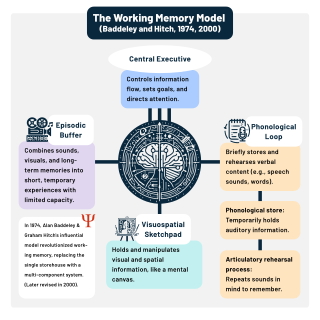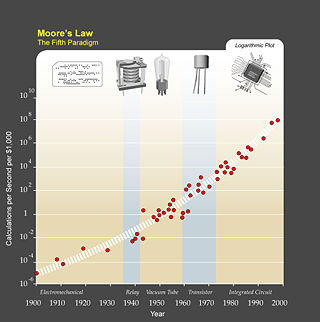
In their most common sense, the terms thought and thinking refer to cognitive processes that can happen independently of sensory stimulation. Their most paradigmatic forms are judging, reasoning, concept formation, problem solving, and deliberation. But other mental processes, like considering an idea, memory, or imagination, are also often included. These processes can happen internally independent of the sensory organs, unlike perception. But when understood in the widest sense, any mental event may be understood as a form of thinking, including perception and unconscious mental processes. In a slightly different sense, the term thought refers not to the mental processes themselves but to mental states or systems of ideas brought about by these processes.
Planning is the process of thinking regarding the activities required to achieve a desired goal. Planning is based on foresight, the fundamental capacity for mental time travel. Some researchers regard the evolution of forethought - the capacity to think ahead - as a prime mover in human evolution<refname="pmid17963565">Suddendorf T, Corballis MC. "The evolution of foresight: What is mental time travel, and is it unique to humans?"(PDF). The Behavioral and Brain Sciences. 30 (3): 299–313, discussion 313–51. doi:10.1017/S0140525X07001975. PMID 17963565. We maintain that the emergence of mental time travel in evolution was a crucial step toward our current success.
</ref> Planning is a fundamental property of intelligent behavior. It involves the use of logic and imagination to visualize not only a desired result, but the steps necessary to achieve that result.
Hindsight bias, also known as the knew-it-all-along phenomenon or creeping determinism, is the common tendency for people to perceive past events as having been more predictable than they were.
Semantic memory refers to general world knowledge that humans have accumulated throughout their lives. This general knowledge is intertwined in experience and dependent on culture. New concepts are learned by applying knowledge learned from things in the past.
Episodic memory is the memory of everyday events that can be explicitly stated or conjured. It is the collection of past personal experiences that occurred at particular times and places; for example, the party on one's 7th birthday. Along with semantic memory, it comprises the category of explicit memory, one of the two major divisions of long-term memory.
Scenario planning, scenario thinking, scenario analysis, scenario prediction and the scenario method all describe a strategic planning method that some organizations use to make flexible long-term plans. It is in large part an adaptation and generalization of classic methods used by military intelligence.

Baddeley's model of working memory is a model of human memory proposed by Alan Baddeley and Graham Hitch in 1974, in an attempt to present a more accurate model of primary memory. Working memory splits primary memory into multiple components, rather than considering it to be a single, unified construct.

Futures studies, futures research, futurism research, futurism, or futurology is the systematic, interdisciplinary and holistic study of social/technological advancement, and other environmental trends; often for the purpose of exploring how people will live and work in the future. Predictive techniques, such as forecasting, can be applied, but contemporary futures studies scholars emphasize the importance of systematically exploring alternatives. In general, it can be considered as a branch of the social sciences and an extension to the field of history. Futures studies seeks to understand what is likely to continue and what could plausibly change. Part of the discipline thus seeks a systematic and pattern-based understanding of past and present, and to explore the possibility of future events and trends.
Strategic foresight is a planning-oriented discipline related to futures studies. In a business context, a more action-oriented approach has become well known as corporate foresight.

Stumbling on Happiness is a nonfiction book by Daniel Gilbert, published in the United States and Canada in 2006 by Knopf. It has been translated into more than thirty languages and is a New York Times bestseller.

The following outline is provided as an overview of and topical guide to thought (thinking):
Kent Cochrane, also known as Patient K.C., was a widely studied Canadian memory disorder patient who has been used as a case study in over 20 neuropsychology papers over the span of 25 years. In 1981, Cochrane was involved in a motorcycle accident that left him with severe anterograde amnesia, as well as temporally graded retrograde amnesia. Like other amnesic patients, Cochrane had his semantic memory intact, but lacked episodic memory with respect to his entire past. As a case study, Cochrane has been linked to the breakdown of the single-memory single-locus hypothesis regarding amnesia, which states that an individual memory is localized to a single location in the brain.
In psychology, mental time travel is the capacity to mentally reconstruct personal events from the past as well as to imagine possible scenarios in the future. The term was coined by Thomas Suddendorf and Michael Corballis, building on Endel Tulving's work on episodic memory.
Feedforward, Behavior and Cognitive Science is a method of teaching and learning that illustrates or indicates a desired future behavior or path to a goal. Feedforward provides information, images, etc. exclusively about what one could do right in the future, often in contrast to what one has done in the past. The feedforward method of teaching and learning is in contrast to its opposite, feedback, concerning human behavior because it focuses on learning in the future, whereas feedback uses information from a past event to provide reflection and the basis for behaving and thinking differently. In isolation, feedback is the least effective form of instruction, according to US Department of Defense studies in the 1980s. Feedforward was coined by I.A Richards in 1951, and applied in the behavioral and cognitive sciences in 1976 by Peter W. Dowrick in his dissertation.
Autonoetic consciousness is the human ability to mentally place oneself in the past and future or in counterfactual situations, and to thus be able to examine one's own thoughts.
In psychology, prospection is the generation and evaluation of mental representations of possible futures. The term therefore captures a wide array of future-oriented psychological phenomena, including the prediction of future emotion, the imagination of future scenarios, and planning. Prospection is central to various aspects of human cognition and motivation. Daniel Gilbert (psychologist) and Timothy Wilson coined the term in 2007. It has since become a central area of enquiry in the cognitive sciences.
Episodic-like memory is the memory system in animals that is comparable to human episodic memory. The term was first described by Clayton & Dickinson referring to an animal's ability to encode and retrieve information about 'what' occurred during an episode, 'where' the episode took place, and 'when' the episode happened. This ability in animals is considered 'episodic-like' because there is currently no way of knowing whether or not this form of remembering is accompanied by conscious recollection—a key component of Endel Tulving's original definition of episodic memory.

Nicola Susan Clayton PhD, FRS, FSB, FAPS, C is a British psychologist. She is Professor of Comparative Cognition at the University of Cambridge, Scientist in Residence at Rambert Dance Company, co-founder of 'The Captured Thought', a Fellow of Clare College, Cambridge, where she is Director of Studies in Psychology, and a Fellow of the Royal Society since 2010. Clayton was made Honorary Director of Studies and advisor to the 'China UK Development Centre'(CUDC) in 2018. She has been awarded professorships by Nanjing University, Institute of Technology, China (2018), Beijing University of Language and Culture, China (2019), and Hangzhou Diangi University, China (2019). Clayton was made Director of the Cambridge Centre for the Integration of Science, Technology and Culture (CCISTC) in 2020.
Sex differences in cognition are widely studied in the current scientific literature. Biological and genetic differences in combination with environment and culture have resulted in the cognitive differences among males and females. Among biological factors, hormones such as testosterone and estrogen may play some role mediating these differences. Among differences of diverse mental and cognitive abilities, the largest or most well known are those relating to spatial abilities, social cognition and verbal skills and abilities.

Spatial ability or visuo-spatial ability is the capacity to understand, reason, and remember the visual and spatial relations among objects or space.






